
|
Sale 58
Manuscript, Collectibles and Aerospace Auction
| Signers of the U.S. Declaration of Independence |
| |
| |
| Lot |
Photo |
Description |
Realized |
Lot 43 |
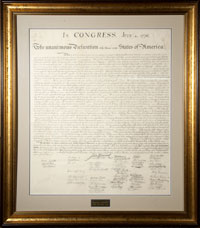 |
[Declaration of Independence] Peter Force Rice-paper Copy. 28½ x 24 inches, matted with a small plaque and beautifully framed to an overall size of 38¾ x 33¾. Faint ink offset; there are clean partial fold splits in the second and third horizontal folds and at the center of the central verical fold, easily repaired.
In 1843, Congress authorized Peter Force to make up to 1500 rice-paper copies of the Declaration of Independence from the copperplate which William Stone had made in 1823 by wetting the original Declaration and transferring some of the original ink to the copperplate. Peter Force intended to use his rice-paper copies in a projected 20-volume series, called American Archives, of primary sources of American history from the 17th century to 1789. The series was sold by subscription and work commenced under contract with the Department of State and by Act of Congress. Nine volumes were published from 1837 to 1853, designated Fourth (six volumes) and Fifth (three volumes) Series, covering the years 1774-76. Subscriptions were fewer than expected, and Force stopped work on the project when further funding was not forthcoming. The actual number of copies printed is unknown, ranging from 500 to around 1,000. The Declaration of Independence was folded into Volume I, Fifth Series. Most copies of the Declaration have been cut from American Archives and sold individually, but they do not come on the market very often. The last several copies have sold for over $30,000. this is a superb specimen and beautifully framed.
Estimated Value $20,000 - 30,000.
View details and enlarged photo
| Realized
$21,600 |
Lot 44 |
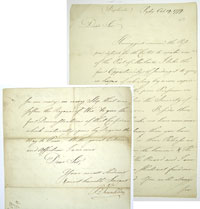 |
Franklin, Benjamin (1706-1790) Founding Father, Signer of the Declaration of Independence, scientist, statesman, diplomat, printer, author. Letter signed "B Franklin," as ambassador to France, one page (recto/verso), 12½ x 8 in, Passy (a suburb of Paris), France, Oct. 19, 1779. Written in an elegant, clerical hand with "(Duplicate)" at the top, to David Hartley, a member of the British Parliament who had gained note as a scientist and through mutual interests became friends with Franklin.
Franklin corresponds with Hartley on the exchange of prisoners: "Having just received the Passport desired for the Cartel to make use of the Port of Morlaix, I take this first Opportunity of sending it to you, in hopes of releasing by more expeditious Voyages the poor Prisoners on both Sides before the Severity of Winter comes on. Besides those released on Parole, we have now more English Prisoners than you have Americans. In those Releases we have relied on the honour & Humanity of the Board and I am persuaded we shall not find ourselves deceived. You will always see me ready in every Step that may soften the Rigours of War to give the first Demonstration of that Confidence which naturally opens by Degrees the Way to Peace…."
The situation of the American prisoners in Britain and British prisoners in France was becoming thorny. The British considered American prisoners traitors and, consequently, refused to reciprocate Franklin's offer to issue paroles to British captives. Through Hartley, who was against the war with America and who, in 1778, wrote a pamphlet ("Letters on the American War") accusing Britain of tyranny over the colonies and urging recognition of American independence, "Franklin urged the easing of the lot of the prisoners as a step toward reconciliation, sent small sums of money for their relief and sought permission for an American envoy…to inspect the conditions in which the American prisoners were kept…." (Esmond Wright, Franklin of Philadelphia, 1986, pp. 281-282)
Normal folds, light creasing, some overall toning, darker at folds on verso. One fold affect the tops of "B" and "F" in the large, bold signature.
Estimated Value $40,000 - 60,000.
Christie's New York, June 19, 2007, lot 249, $40,000.
View details and enlarged photo
| Realized
$34,500 |
Lot 45 |
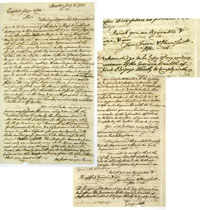 |
Hancock, John (1737-1793) First Signer of the Declaration of Independence; member of the Continental Congress (1775-80, 1785-86) which he served as president from 1775-77. He was the first Governor of Massachusetts and was elected to that office nine times. Autograph Letter Initialed "J.H.", as Governor of Massachusetts, 2 pages (recto and verso of one sheet) plus integral leaf with docket, 12¼ x 7 in., Boston, July 8, 1782. Being Hancock's retained copy of his letter to Captain George Little regarding orders for the sloop Winthrop. Some archival fold repairs and ink bleed-through, but overall clean and legible.
Even though the Revolutionary War had ended and peace negotiations between the U.S. and Great Britain were being held in Paris, many Americans, including George Washington and John Hancock, were suspicious of the British government. In this letter, Hancock commands one of his sea captains to protect Massachusetts ships engaged in trade and to engage any hostile ships threatening the coastline. In part: "Having Appointed & Commissioned you to the Command of the Arm's Sloop Winthrop belonging to this CommonWealth & you having reported to me that the Sloop is in every respect Ready for the Sea; you are hereby Order'd to Embrace the first favorable Weather and proceed with the Sloop under your Command to Sea upon a Cruise for the protection of the Sea Coast against the Enemies of these United States, whose Vessells if not Superior to you in Force you will use your best Endeavours to Take, Sink or Destroy, & should you be so fortunate as to Take any Prizes you will Send them into the Port of Boston, unless Circumstances should occur to you to make it more safe to Land them into any other Port. You will be particularly careful not to fall in the way of a Superior Force, but avoid as much as psossible even the Hazard of being Captur'd, and should you find that there are Vessells of Superior Force to you in the Bay, & your Sloop will be in danger of being Taken, you are directed immediately to Return into the Port of Boston. You will Take under your Convoy any Vessells that are ready & bound to the Eastward, particularly the Schooner bound to Machias with provisions for the Garrison, also the Sloop Roxburn Capn Bosworth with Provisions for Kennebeck River, & a Vessell bound to Frenchman's Bay, these Vessells you are hereby order'd to Take under your Convoy & See them safe to the Several Destin'd ports….As Soon as you have Complied with your orders as to your Convoy & have Discharg'd yourself from them; you will proceed to Cruise along the Eastern Shore, and such other parts as you shall Judge most conducive to answer the principal Object of your Cruise, the protection of the Sea Coast. You will be attentive to the Coasting Vessells from the Eastward & whenever a number of them are Loaded & ready to Sail for Boston…you are hereby Directed to Take them under your Convoy & proceed with them to Boston, & bring your Vessell to Anchor in the Road below, & come up to Town in your Boat, that I may have notice of your Arrival & be made Acquainted with the Occurences of your Cruise…."
Estimated Value $8,000 - 10,000.
The Hancock-Chase Collection, formerly housed at the National Museum of American History.
View details and enlarged photo
| Realized
$7,638 |
Lot 46 |
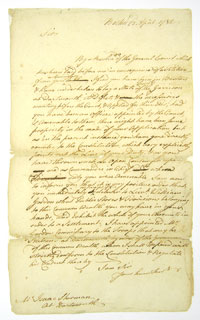 |
Hancock, John. Autograph Letter, one page, 13 x 7¾ in., Boston, April 23, 1782. Overall toning; backed with japan paper; small paper losses at folds affect a few words, which are still legible. Being Hancock's retained copy of a letter written as Governor of Massachusetts in which he fires Isaac Sherman, the commissary officer of the garrison at Dartmouth, appararently for insubordination, after Sherman defied the state constitution and appealed directly to the General Court for funding. In full: "By a Resolve of the General Court which has been laid before me in consequence of a Petition from you as Commissary, I find you have been in Boston & have undertaken to lay a State of the Fort & Garrison at Dartmouth, its Defects & the necessaries wanting, before the Court, & Applied for their Aid; had you have been an officer appointed by the Court, & Amenable to them there might have been some propriety in the mode of your Application, but as in the present instance you have gone directly counter to the Constitution, which very explicitly points out the Line of your Duty, & as you have thrown such an open Contempt upon me as Commander in Chief, to whom only you were Amenable, I am now to inform you that it is my positive order that you immediately on Receipt of this deliver to Lieut. William Gordon what Public Stores & Provisions belonging to this Common Wealth you may have in your hands, and Exhibit the whole of your Accounts in order to a Settlement; I have appointed Mr. Gordon Commissary to the Troops that may be Stationed at Dartmouth, by order of the Governor of this Common Wealth, whom I shall Depend will strictly conform to the Constitution & Regulate his Conduct thereby."
Estimated Value $6,000 - 8,000.
The Hancock-Chase Collection, formerly housed at the National Museum of American History.
View details and enlarged photo
| Unsold |
Lot 47 |
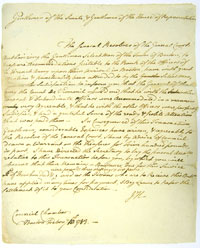 |
Hancock, John. Autograph Manuscript Initialed "JH," one page, Council Chamber, Boston, February 10, 1783. Being Hancock's retained copy of his address to the Massachusetts legislature regarding the quartering of French Army officers returning after the Battle of Yorktown and provisions for the expenses incurred by the people of Boston for their care. Overall toning; some reinforcement and filler, with loss of a few letters, but boldly penned and initialed.
"The several Resolves of the General Court, authorizing the Gentlemen Selectmen of the town of Boston, to prepare accommodations suitable to the Rank of the Officers of [t]he French Army upon their arrival in Boston, have with great [a]ttention & punctuality been attended to by the Selectmen, [& I have] the satisfaction to inform you that the General of that [A]rmy the Count de Viomenil assur'd me, that he with the other General & Subordinate officers were accommodated in a manner very Agreeable, & that he with the other officers were perfectly satisfied, & had a grateful sense of the ready & polite attention that was paid them. In Consequence of this Transaction, Gentlemen, considerable Expences have arisen, & agreeably to the Resolve of the General Court, I have…drawn a Warrrant…for Five hundred pounds…I have Directed the Secretary to lay the several acco[un]ts relative to this Transaction before you, by which you will observe that there Remains a Ballance due for this Service of Four hundred & nine pounds three shillings & six pence, and as the persons who are to Receive this Ball[ance] have applied many times for payment, I Beg Leave to Refer the Settlement of it to your Consideration."
After the Battle of Yorktown, General Rochambeau, and most of the French army which fought under him, wintered in Virginia to discourage further invasions and to avoid the hardship which would be imposed on residents to find provisions for the troops as they marched north. Beginning in July 1782, they slowly made their way north toward Boston, where they would embark for France. By December 1, the French troops arrived and most went directly onto the troop transports in Boston harbor (Boston had arranged quarters for 1,000 troops but that did not begin to meet the need). Some of the officers stayed in homes in Boston, and it is the expenses incurred for these officers to which Hancock refers.
Estimated Value $4,000 - 6,000.
The Hancock-Chase Collection, formerly housed at the National Museum of American History.
View details and enlarged photo
| Unsold |
Lot 48 |
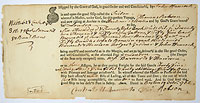 |
Hancock, John. Partly-printed Document Signed "John Hancock" twice in the text, 4½ x 9 in., Boston, Oct. 17, 1761. Hancock fills out a Bill of Lading for the ship "Triton," with Thomas Robson as Master. Hancock names himself as the shipper of the cargo bound for London, which includes, "Six Hundred & Twenty Eight Cask White Oil, Twenty two Thousand & Fifty seven Gallons, & Fifty five Cask Brown Oil…Fifty bundles Whale Bone in equal thirds with Barnards & Harrison Holger & Gardner & John Hancock, being mark�d and number�d as in the Margin, and are to be deliver�d in the like good Order, and well Condition�d, at the aforesaid Port of London (the Danger of the Seas only excepted) unto Messrs. Harrison & Barnard or to their Assigns, he or they paying Freight for the said Goods Forty five shillgs Sterlg pr Ton for Oil, & Forty shillings pr Ton for Bone with Primage and Average accustom�d….And so God send the good Ship to her desir'd Port in Safety. Amen…." The master of the ship signs at bottom. Age toning, else fine.
Estimated Value $1,500 - 2,000.
View details and enlarged photo
| Realized
$1,469 |
Lot 49 |
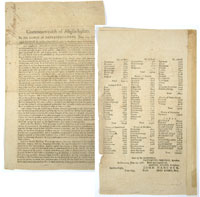 |
[Hancock, John & Samuel Adams]. Printed Act of the Commonwealth of Massachusetts, 4pp, 12½ x 7½ in., front and verso (Boston), June 22, 1781. Beginning "Whereas the supplies of beef hitherto made by the several towns and plantations in this Commonwealth, for the purpose of [furnishing our army] with that [article], are found to be insufficient; and without a further punctual and adequate supply, our brethren who are now hazarding their lives for our defence, must soon be obliged to quit the field, and leave the country to the merciless ravages of our enemies. And whereas the Commander in Chief of the army hath represented, in the most pressing terms, the necessity of an immediate supply of provisions, to enable him to carry on the operations of the present campaign with vigour, and, by the blessing of Heaven, with success." The House of Representatives then resolved, and the Senate concurred "That the inhabitants of the several towns and plantations in this Commonwealth be, and are hereby required, to furnish the quantity of live beef, including hides and tallow, set to such towns and plantations respectively, as is in the schedule hereunto annexed, or such sums of money as in the judgement of the superintendant shall enable him to purchase the same…" The listing of Massachusetts towns and plantations, arranged by counties, begins in the lower portion of the second page and fills the third and fourth pages, where it is signed in type at the conclusion by the Speaker of the House, Nathaniel Gorham, the President of the Senate, Samuel Adams, and the Governor of the Commonwealth of Massachusetts, John Hancock. The weight of the beef required is listed next to each town. Included is a timetable requiring one-sixth of the town's quota to be delivered monthly beginning on or before July 10th, ending on December 10th. "Willmington" (sic) is penned in the upper left margin of the first page of this document and, after the listing of "Wilmington" on the third page, the words "is Wtt 602½ pr month" have been added in ink. The quantity of beef listed next to "Wilmington" is 3614; six beef deliveries of 602½ each amounts to 3615. This copy was undoubtedly the one sent to Wilmington, Middlesex County, Massachusetts, about 18 miles northwest of Boston.
Six weeks earlier, in a "Circular to the New England States" sent to the Governors, dated from Head Quarters, New Windsor, New York, May 10, 1781, the Commander in Chief, George Washington, wrote, in part, "…. I believe there is not…at this moment, one day's supply of Meat on hand….Supplies, particularly of Beef Cattle must be speedily and regularly provided, or our Posts cannot be maintained or the Army kept in the Field much longer." Four months after this act was passed, on October 19, 1781, British General Cornwallis surrendered to General Washington at Yorktown, Virginia, and, while the Treaty of Paris ending the war was not signed until 1783, the Revolutionary War was, in effect, over.
Two old horizontal folds obliterate four of the words in the opening paragraph as noted above. There are other folds and the edges are chipped with small tears affecting five town names and five beef quotas. Paper and glassine are along the spine edge of the fourth page where this printing had undoubtedly been affixed to an album page. Paper a bit toned. Overall, in good condition. Evans 17221.
Estimated Value $1,500 - 2,000.
View details and enlarged photo
| Unsold |
Lot 50 |
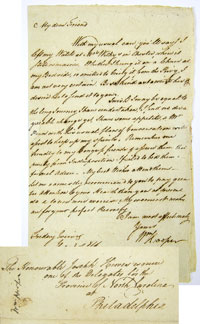 |
Hooper, William (1742-1790) Signer of the Declaration of Independence from North Carolina. Autograph Letter Signed "Wm Hooper," one page plus integral address leaf, 12¼ x 7½ in., Head of Elk (Maryland), Friday Evening. Undated, but March 1776. Integral leaf addressedd by Hooper to "The Honourable Joseph Hewes esquire / one of the Delegates for the Province of North Carolina at Philadelphia." Docketed "Wm Hooper" by Hewes.
The letter reads in full: "My dear Friend With my usual care (you'll say) I left my Watch at Mrs. Withys in Chester, where it still remains. Whether I hung it on a Chair at my Bedside, or omitted to bring it from the Privy, I am not very certain. Be so kind as to write her & desire her to send it to you. I wish I may be equal to the long Journey I have undertaken, I find no disa[gree]able change yet, I have some appetite, & Mr. [Pe]nn with his usual flow of Conversation will assist to keep up my spirits. Remember me kindly to my Congress friends & assure them that purely from Indisposition I failed to bid them a formal Adieu. My best Wishes attend them. Let me earnestly recommend to you to pay great Attention to your Health than you at present do & to use more exercise. My warmest wishes are for your perfect Recovery. I am most affectionately / Yours / Wm Hooper." A seal tear at left edge affected three letters of the word "disagreeable" and two and a half letters of the name "Penn"; paper loss from the small seal tear and the missing letters have been replaced. William Hooper, John Penn (who was Hooper's companion on this trip), and Joseph Hewes comprised North Carolina'a delegation to the Continental Congress; all three of them signed the Declaration of Independence. Mrs. Withy's Inn, a boarding house about 15 miles south of Independence Hall in Chester, Pennsylvania, owned by widow Mary Withy, is probably where Hooper stayed while attending Congress.
William Hooper and John Penn left Philadelphia for North Carolina in March 1776 to attend its Fourth Provincial Congress, which met in Halifax, North Carolina from April 4th through May 14, 1776. In a letter written by Joseph Hewes on Wednesday, March 27, 1776, to Robert Smith, his shipping business partner in North Carolina, Hewes says, "Unless Hooper or Penn should return I cannot leave the Congress. I dare not leave our Province unrepresented, or perhaps you might get some trusty person to come express in the service of the Province in case they should think such a thing Necessary to bring any particular information." Hooper's letter was penned on "Friday Evening," from Head of Elk (today, Elkton), Maryland, which is about 30 miles south of Chester, Pa., so it was written on his way to North Carolina, most likely on Friday, March 15 or 22. On April 12, 1776, the 83 delegates present at the Provincial Congress of North Carolina, including Hooper and Penn, unanimously adopted the following resolution: "Resolved that the delegates for this Colony in the Continental Congress be empowered to concur with the delegates of the other Colonies in declaring Independency," thereby becoming the first colony to authorize its delegates to the Continental Congress to vote for independence. The date "April 12, 1776" appears on both the flag and the Great Seal of the State of North Carolina.
Hooper letters written in 1776 are exceedingly rare. Only a handful have ever been sold at auction. This letter is in fine condition. It is written on laid, watermarked paper and is boldly penned and signed. It is especially desirable because it is from William Hooper to Joseph Hewes and mentions John Penn and their "long Journey" to Halifax, North Carolina, where Hooper, Penn, and Hewes would be authorized to vote for independence, the first delegates so authorized by any colony. This letter would be an extraordinary addition to a Signers collection.
Estimated Value $15,000 - 20,000.
View details and enlarged photo
| Realized
$13,513 |
Lot 51 |
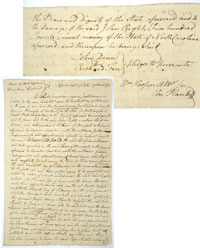 |
Hooper, William. Revolutionary War-date Autograph Document Signed "Wm Hooper Atty for The Plaintiff," 1½ pp, 13 x 8 in., recto/verso, with integral leaf, Superior Court of Justice, State of North Carolina, New Bern District, March 19, 1778. On watermarked, laid paper. Fine condition.
In part, "John Right Complains against Joseph Wrong in Custody for this cause, to wit, that upon the twentieth day of February in the year of our Lord One thousand seven hundred and Seventy five in the County of Carteret in the district of New Bern in the State of North Carolina, Joseph Bell Innholder in the County aforesaid demised [leased] granted and to farm Let to the said John Right a certain … Lot of Land in the said Town of Beaufort…for and owing the term of Five Years….the aforesaid Joseph Wrong illegally dispossed the said John Right by force and arms into the said Lot and the houses thereon … and still doth withhold and then and there did other injuries to him the said John Right against the Peace and dignity of the State aforesaid and to the Damage of the said John Right Five hundred Pounds Current money of the State of North Carolina aforesaid, and therefore he brings suit…"
During the Revolutionary War, Beaufort, North Carolina, was pro-patriot. Many privateers serving the American cause used the port. Saltworks were built nearby to supply the colony and state. Previously, salt had been imported from England. Joseph Bell (1739-1813) was a son of Carteret County Justice Joseph Bell, Sr.
Beneath Hooper�s statement is a Manuscript Document Signed "Joseph Wrong" (text and signature by Hooper) penned "To Mr Joseph Bell Tenant in possession of the Premisses on the within Declaration of Ejectment mentioned." In full, "I am informed that you are in possession or Claim a Tith to the Premisses in this Declaration of Ejectment mentioned or to some part thereof and I being sued in this action as a casual Ejection and having no claim or Title to the same, do advise you to appear at the Superior Court of Law to be held for the District of New Bern at the Court House in New Bern on the Twentieth day of May next by some Attorney of that Court and then and there by a Rule of the same Court to cause yourself to be made Defendant in my stead otherwise I shall suffer Judgment to be entered against me and you will be turned out of Possession."
On the integral leaf appears an Autograph Document Signed "Melachi Bell" as Deputy Sheriff certifying "that the Declaration and Notice was served on the said Joseph Bell on the Twentieth Day of March, 1778." Melachi Bell (1745-1803) was Joseph Bell�s brother.
Estimated Value $3,500 - 5,000.
View details and enlarged photo
| Unsold |
Lot 52 |
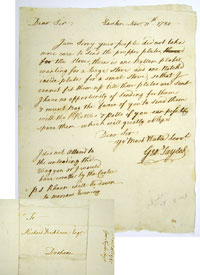 |
Taylor, George (1716-1781) Founding Father and Signer of the Declaration of Independence from Pennsylvania. Born in Ireland, he indentured himself to ironmaster Samuel Savage, Jr. to finance his passage to America in 1736, In 1742, Savage died and Taylor married his widow, Ann. He managed Savage's two ironworks until Savage's son came of age in 1752. In 1755, Taylor formed a partnership to lease Durham Furnace in Upper Bucks County and Taylor became the ironmaster. About the same time, he entered public service. He served as a justice of the peace in Bucks County, then Northampton County, and in 1774 was elected to the Pennsylvania Provincial Assembly. In July 1775, he was commissioned a colonel in the Third Battalion of the Pennsylvania Militia, and in August he secured a contract for cannon shot from the Pennsylvania Committee of Safety; Durham Furnace became the first ironworks in Pennsylvania to furnish munitions to the Continental Army. When independence was declared, five of Pennsylvania's delegates to the Continental Congress were forced to resign because they were loyalists. Taylor was one of five replacements named by the Pennyvania Assembly on July 20th; thus, on August 2, 1776, he affixed his signature to the Declaration of Independence. Taylor served only seven months in the Congress, not being renominated in March 1777. Instead he was appointed to Pennsylvania's Supreme Council, but ill health caused him to cut short his service. Taylor was one of only eight foreign-born Signers, the only one to have been indentured, and the only ironmaster among the group.
Very rare Autograph Letter Signed "Geo. Taylor," one page with integral address leaf, 8¼ x 6½ in., Easton (Pa.), November 11, 1780. Written three months and twelve days before his death. Taylor addressed the integral leaf to Richard B. Backhouse at Durham: "I am sorry your people did not take care to send the propper plates ["there" is marked through] for the stoves, there is one Bottom plate wanting for a Large stove and one notchd inside plate for a smal[l] stove, so that I cannot fit them up till those plates are sent. I have no opportunity of sending for them & must Beg the favor of you to send them with the Kettles & potts if you can possibly spare them…." He adds a note at lower left, "I did not attend to the unloading the waggon or I would have wrote by the Carter. P.S. Rhoan will be down to morrow Evening." Written on laid, watermarked paper. Light toning; minor soiling to address leaf. Thin strip of archival tape at right edge of address leaf, also on verso at lower edge and down left margin of verso. Boldly penned and signed. Overall fine condition. Another opportunity to acquire a George Taylor ALS may not occur for years.
Estimated Value $50,000 - 60,000.
View details and enlarged photo
| Unsold |
|
|